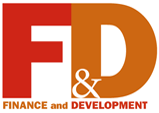
Archive of F&D Issues
Do you subscribe to the hard copy of F&D?

Please fill in this pdf survey
|
|

Subscription Information

Subscription Application Form
(pdf, 420 Kb)

About F&D

Copyright Information

Use the free Adobe Acrobat Reader to view pdf files
Free Email Notification
Receive emails when we post new
items of interest to you.
Subscribe or
Modify your profile

|

|

|

|

A quarterly magazine of the IMF |
|
June 2007
Volume 44, Number 2 |
The Economic Power of Women

Smart Economics
Mayra Buvinic and Elizabeth M. King
This issue spotlights gender equality. In the first article on gender, we learn about the progress made so far toward fulfilling the targets set out in the third Millennium Development Goal (MDG3). Not only is MDG3 a vital development objective but it is also key to achieving several of the other MDGs.
Budgeting with Women in Mind
Janet Stotsky
One way for countries to pinpoint policies needed to reduce gender disparities is through gender budgeting, which involves the systematic examination of budget programs and policies for their impact on women. As "Budgeting with Women in Mind" explains, this effort to mainstream gender analysis into government policies has gained prominence in recent years.
Getting All Girls into School
Maureen Lewis and Marlaine Lockheed
Despite important progress in recent years, an estimated 43 million girls around the world are still not enrolled in school. The majority of them are from socially excluded groups. New strategies for educating these "excluded girls" must be found.
Also in This Issue

Asia Ten Years Later
David Burton and Alessandro Zanello
Two IMF economists look at Asia—a star performer in the global economy—10 years after the Asian financial crisis. They explore what lies behind Asia's success and what the region needs to do to in order to hold on to regained ground and become an ever-greater economic force.
Point of View
Asia's Decade of Transformation
Zeti Akhtar Aziz
Malaysia's central bank governor argues that Asia's increasing role in the global economy further reinforces the need for it to have a commensurate voice and representation in the international financial community.
Point of View
Korea: In Search of a New Compact
Un-Chan Chung
Professor Chung (Seoul National University) calls for a "new social compact" if the globalized system is to achieve success in Korea.
|
 |
Underutilized Capital
David Dollar and Shang-Jin Wei
China's rapid growth has helped fuel a massive investment spree, resulting in an invest-to-GDP ratio of more than 40 percent in 2005. The authors suggest that too much of that investment is made by state-owned companies, which are less efficient than privately owned or foreign companies. If China were to end its bias toward state companies, the country could raise living standards without sacrificing growth.
Getting Together
Ulrich Jacoby
The author looks at the new partnership between Africa and China for aid and trade. Rising trade and direct investment could create employment opportunities and facilitate the transfer of technology. But in order to make the most of the opportunities provided by China, African countries should also strengthen their own policies relating to both trade and aid use.
Connecting Africa and Asia
Harry G. Broadman
The recent surge in developing country commerce between Africa and Asia epitomizes the explosion of South-South trade. Even though the boom in natural resource exports to China and India are providing short-term benefits, African countries need strategies to leverage the current export explosion to create opportunities for long-term economic benefits.
Making Remittances Work for Africa
Sanjeev Gupta, Catherine Pattillo, and Smita Wagh
The volume of remittances flowing into developing countries is rising, with those to sub-Saharan Africa increasing by more than 55 percent between 2000 and 2005. These remittances are having many positive effects in the recipient countries but need to be used more effectively. Ultimately, however, they are no substitute for a sustained, domestically engineered development effort in the region.
A Government's Net Worth
Bob Traa and Alina Carare
A new tool in surveillance, the public sector balance sheet, can help to diagnose vulnerabilities that are not immediately visible in the budget.
Getting Spending Right
Benedict Clements, Christopher Faircloth, and Marjin Verhoeven
Latin America's recent economic performance has been strong. But the region needs to reform public spending to make it more efficient, better help the poor, and improve lagging infrastructure. |
Departments

Letter from the Editor
Letters to the Editor
The merits of private equity; Building a solid foundation; Deciding how to spend the oil windfall; Hunger is the real problem; Where the grass is greener; Fighting HIV-AIDS
In Brief

Elusive MDGs
IMF adopts new fiscal transparency code
A bigger club
Running short
Staying warm in Siberia
Picture This

Globalization of Labor
Florence Jaumotte and Irina Tytell
Over the last two decades, labor has become increasingly globalized. The integration of new players into the world economy has led to an estimated fourfold increase in the effective global labor force. This labor pool is being accessed by advanced countries through imports of final products, offshoring, and immigration.
Back to Basics

Microfinance: Banking for the Poor
Ina Kota
In the past three decades, microfinance has mushroomed into a global industry that provides financial services to the poorest of the poor. This primer on microfinance notes that the field now includes "branchless banking" and a digital microfinance marketplace.
Book Reviews

Regulating Infrastructure: Monopoly, Contracts, and Discretion, José A. Gómez-Ibáñez
The Future of Europe: Reform or Decline, Alberto Alesina and Francesco Giavazzi
Emerging Markets and Financial Globalization: Sovereign Bond Spreads in 1870-1913 and Today, Paolo Mauro, Nathan Sussman, and Yishay Yafeh
Country Focus

Bulgaria
Having joined the European Union in January 2007, Bulgaria is off to a promising start in its marathon to catch up with the living standards of its new European partners. But the challenge ahead will be to maintain competitiveness.
|
|
